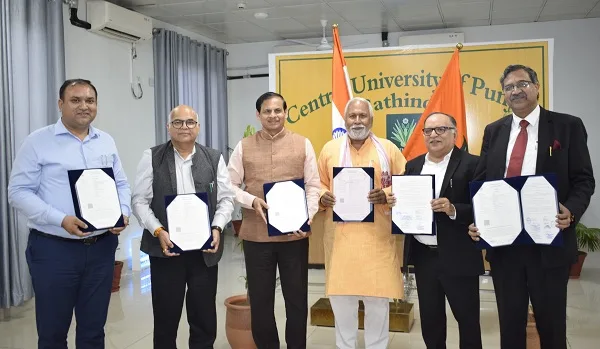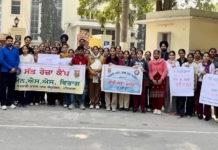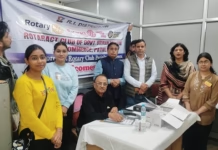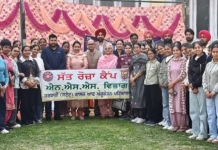Central University of Punjab hosts the 1st Meeting of Consortium of Higher Educational Institutions of North India
Kanwar Inder Singh/ royalpatiala.in News/ August 26,2023
Heads of six premier educational institutions gathered at the Central University of Punjab on Saturday to attend the first meeting of the Consortium of Higher Educational Institutions of North India (CHEINI). This Consortium is a joint venture of the Central University of Jammu, Central University of Haryana, Central University of Himachal Pradesh, Central University of Punjab, Central University of Rajasthan, and the Indian Institute of Technology, Ropar. The signing of this MoU took place on July 29, 2023, during the Akhil Bharatiya Shiksha Samagam held at Bharat Mandpam, New Delhi, in the august presence of Education Minister of India, Dharmendra Pradhan. The Heads of the aforementioned HEIs participated in this meeting for the first time to outline a roadmap aimed at enhancing collaboration in terms of research, academic activities, and social outreach.
At the outset, Prof. Raghavendra P. Tiwari, the Vice-Chancellor of CU Punjab and the host of this meeting, welcomed the esteemed dignitaries, including Prof. Rajeev Ahuja, Director of IIT Ropar; Prof. Tankseshwar Kumar, Vice-Chancellor of CU Haryana; Prof. Anand Bhalerao, Vice-Chancellor of CU Rajasthan; Prof. S. P Bansal, Vice-Chancellor of CU Himachal Pradesh; and Prof. Yashwant Singh, Registrar of CU Jammu.
Central University of Punjab hosts the 1st Meeting of Consortium of Higher Educational Institutions of North India. Prof. Tiwari, in his welcome address, briefed about the strengths of the Central University of Punjab in the field of academics and research. He asserted that in the 21st-century era, collaboration is the key to accomplishing success in imparting holistic education and conducting high-quality research. He shared the progress made by Consortium of High Educations Institutions of the Bathinda region in advancing the level of education and research in this area and highlighted that the Consortium of Higher Educational Institutions in North India (CHEINI) has a significant role to play in transforming the higher education landscape of north India. Prof. Anjana Munshi, Director R&D Cell of CU Punjab, made a presentation on progress made by university in research.
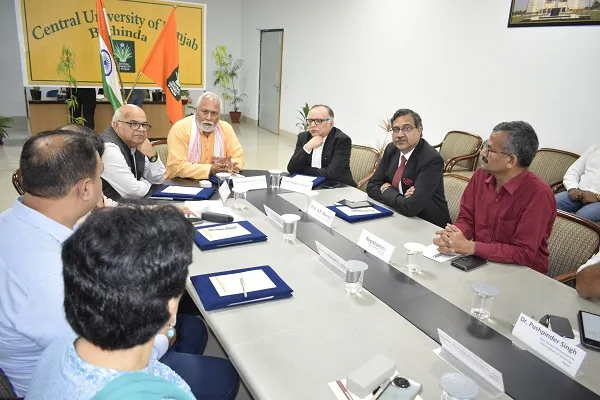
Following this, all delegates discussed the possibility of implementing various NEP-2020 reforms and other innovative ideas, such as the exchange of faculty and students, submission of joint research projects, joint consultation, joint Ph.D. programs, offering Joint Academic Programs, Dual Degree Programs, conducting Joint Workshops/Symposiums, and joint internships. To begin with, all members agreed to work upon formalities for initiation of exchange of students and teachers, joint internships and joint Ph.D. Programmes.
Prof. Rajeev Ahuja, Director of IIT Ropar, mentioned that publication in a high-impact journal could be possible with collaboration, and this consortium, CHEINI, will provide a platform for the faculty of all member HEIs to interact with each other and join hands to work together to find innovative solutions for societal problems. He assured to extend all possible support on behalf of IIT Ropar in realizing the objectives of consortium.
Prof. S. P Bansal, Vice-Chancellor of CU Himachal Pradesh, emphasized that this consortium could serve as an excellent platform for the optimal utilization of resources. Currently, every HEI has its strengths in the domains of expertise and infrastructural facilities. The sharing of resources would help each institute avoid duplication of facilities and develop their super specialization in a particular domain. Additionally, it will encourage faculty and students to access the facilities of various member HEIs to excel in academics and research.
Prof. Anand Bhalerao, Vice-Chancellor of CU Rajasthan, mentioned that continuous dialogue is important to ensure the success of CHEINI. Therefore, all member HEIs should nominate nodal officers who will meet regularly every month, and heads should ensure they meet four times a year to monitor performance and plan further courses of action.
Prof. Tankeshwar Kumar, Vice-Chancellor of CU Haryana, mentioned that the initial step to foster collaboration in research could be achieved through the introduction of joint supervision of Ph.D. programs where multiple co-supervisors could be assigned to a research scholar to enhance the quality of Ph.D. work. He also insisted that faculty of all member HEIs should be sensitized to the objectives of this Consortium to ensure their full participation.
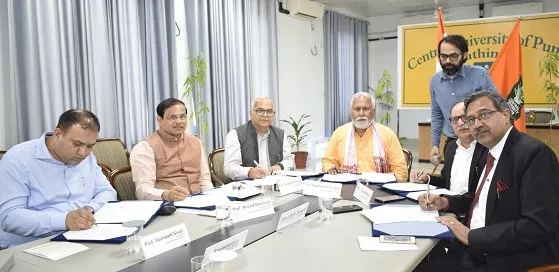
Prof. Yashwant Singh, Registrar of CU Jammu, asserted that this Consortium is a great initiative to promote innovation in the education ecosystem. He provided assurance on behalf of Prof. Satish Jain, Vice-Chancellor of CU Jammu, that their university will provide full support in accomplishing the mission of this consortium.
Dr. Pushpendra from IIT Ropar presented innovative ideas to encourage faculty from diverse disciplines to engage in collaborative research ventures within the realms of data science and artificial intelligence. The overarching goal is to formulate impactful solutions addressing challenges in the agriculture and healthcare sectors.
After the discussion, all delegates signed a detailed MoU and finalized that a team consisting of the Dean of Academics, Dean of Research, and Director of IQAC of each member HEI would assemble at CU Rajasthan in September 2023 for a two-day meeting to prepare a white paper regarding the action plan of this consortium to accomplish the objectives set in the first meeting.
Central University of Punjab hosts the 1st Meeting of Consortium of Higher Educational Institutions of North India. Towards the end, Prof. B.P. Garg, Registrar (I/c) and Controller of Examinations, gave a formal vote of thanks. On this occasion, Prof. R.K. Wusirika, Dean Incharge of Academics, Prof. Anjana Munshi, Dean of Research, Prof. Monisha Dhiman, Director of IQAC, and Dean of Schools were also present.
This consortium, if succeeds in implementing the objectives of MoU, may emerge as a model of inter-institutional co-operation in education ecosystem in India.

